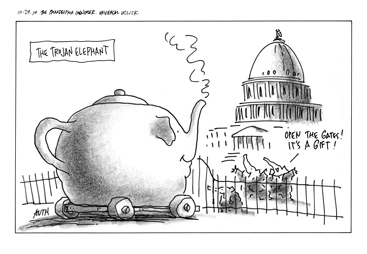Pulitzer Prize-Winning Cartoonist Tony Auth Is Subject of Retrospective at the Michener


“TO STIR, INFORM AND INFLAME”: Cartoons by Philadelphia Inquirer editorial cartoonist Tony Auth will be on view at the Michener Museum from June 2 through September 23. Above, “The Trojan Elephant.” (From the collection of the artist.)
“I read widely and comment on things that rise to some sort of level where my alarms go off,” said political cartoonist Tony Auth in a recent interview. The fruits of many of those alarms will be on view in the exhibit “To Stir, Inform, and Inflame: The Art of Tony Auth,” from June 2 through September 23, in the Michener Art Museum’s Fred Beans Gallery.
This retrospective exhibition gathers together the full range of Mr. Auth’s art, including drawings, paintings, sketches, and newspaper pages, as well as a selection of his award-winning children’s book illustrations.
The impetus for the retrospective occurred when Mr. Auth recently retired after 40 years as editorial cartoonist at The Philadelphia Inquirer. A curator who was appraising Mr. Auth’s archive suggested it, and the Michener was “all for it.”
During his time at The Inquirer, Mr. Auth won one of the paper’s first Pulitzer Prizes in 1975, the Thomas Nast Prize in 2002, and the Herblock Prize in 2005. Auth fans needn’t worry that they’ve seen the last of his cartoons, though; he’s now the first-ever digital artist in residence at WHYY’s NewsWorks.
“Tony Auth is a no-nonsense, New Dealish, Frank Capra kind of cartoonist,” Jules Feiffer has observed. “Cartooning is basically a critical medium,” noted Mr. Auth. “You support someone by criticizing their enemies.” Mr. Auth’s criticism can come in many forms. “Political cartoons are so wide-ranging in what they attempt to do,” he commented. “Sometimes I’m ironic, sometimes whimsical, sometimes nostalgic.”
Asked whether, after so many years of observing local, national, and international politics, he ever feels discouraged, Mr. Auth was quick to say no. “I don’t think you can do this kind of work and have it ring true unless you’re optimistic on some fundamental level. If you become cynical, I think it becomes quickly visible in the work — and it certainly wouldn’t be any fun to do if you were cynical.”
“Tony Auth and his work is for anyone interested in politics, culture, cartoons, newspaper work, and the life of an illustrator in late 20th century and early 21st century in America,” commented guest curator David Leopold, who has organized exhibitions for a wide range of museums including the Library of Congress and the New York Public Library in America; and the Victoria and Albert Museum in London; and Berlin’s Filmmuseum in Europe. “His seemingly unflappable optimism and unwillingness to bow to power give us all a voice on the issues of the day. He might not show us or our leaders at our best, but there is always his hope that we will all be better.”
Mr. Auth found newspaper comic strips (“so wonderfully drawn”) a particular influence as he was growing up. His influences today, some of whom show up in the Michener exhibit, include Jules Feiffer, David Lowe, and Pat Oliphant. Other influences include children’s book illustrators like Maurice Sendak and Quentin Blake. “There’s a whole list of artists I admired and still admire,” he observed.
Mr. Auth named Barack Obama as a current favorite among public figures. He is impatient with those who say that the president hasn’t made good on his promises. “I think a lot of people confuse the role of president with the role of advocate,” he pointed out. “Look at his list of accomplishments; it’s pretty amazing considering what he’s been up against.
“I recently read Doris Kearns Goodwin’s book on Lincoln, and it became very clear to me that the role of president is not to be ahead of the people on certain issues,” Mr. Auth continued. “The whole art of leadership is so complex; it doesn’t do Obama or his causes any good to be defeated at the polls.
“Disagreement is a given,” said Mr. Auth of his profession. There is “always a little cluster of issues at that particular moment that are very hot to handle, whatever you say.” He cites the Middle East, the role of religion, the Catholic Church, Israel, Islam, and abortions as current hot-button issues, noting that he responds “to criticism that doesn’t seem dripping with hatred. There’s nothing to be gained from getting into that kind of dialog.”
Mr. Auth’s colleagues at the Philadelphia Inquirer have described him as a “very, very serious journalist” who attended every editorial meeting (see http://vimeo.com/41168044). His move to WHYY reflects an interest in continuing to be part of a news-gathering operation, albeit one that is evolving rapidly. “It’s hard to imagine a viable democracy without a serious and robust free press,” he observed.
The James A. Michener Art Museum is located at 138 South Pine Street in Doylestown, Pennsylvania. Museum hours are Tuesday through Friday, 10 a.m. to 4:30 p.m.; Saturday 10 a.m. to 5 p.m.; and Sunday noon to 5 p.m. For more information, visit www.michenerartmuseum.org or call (215) 340-9800.

